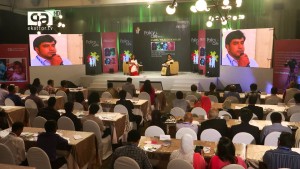The apparel manufacturing and exporting industry lobby BGMEA has agreed to recruit people with autism in the clothing industries in a move to create job opportunities for them.
US-licensed school psychologist Saima Wazed Hossain Putul, the prime minister’s daughter, who spearheads disability campaign in Bangladesh, presented them a roadmap on how to employ those “honest, dedicated and loyal” children in a unique event in Bangladesh.
BGMEA organised this event bringing together factory owners, parents of the children with autism, and government officials at its headquarters in Dhaka to raise awareness about those children’s employability.
According to UN estimates, more than 80 percent of adults with autism are unemployed globally, though they have abilities.
BGMEA’s announcement delighted parents who have had to confine their children with autism at home, when they grow up, since they have nothing to do, despite having some skills.
Its President Md Atiqul Islam said clothing factories would employ them, as “they are competent to work”.
“We’ll give them work, they’ll give return. This is not charity.”
“Let’s start working together,” he told the parents who train up their kids with autism with a particular skill of their choice.
Clothing is the largest export sector of Bangladesh that employs about four million workers.
Putul said a roadmap would be needed to employ them “properly”.
“It’s not giving one or two jobs,” she said, adding the clothing industry’s slogan “made in Bangladesh with pride” would be a reality when there would be no one left behind.
“Everyone is included,” she said.
Autistic children cannot pick up self-care tasks – dressing, self-feeding, using toilet etc – by watching and imitating. They do not make eye-to-eye contact and have a single-track thought process.
The problem usually begins to show up in the first three years of life, affecting their normal development of social and communication skills. No one can say why, but the trend is rising.
Bangladesh has no data on the number of children suffering from the disorder, but a latest US study finds one in every 68 children to be autistic – a rate 30 percent higher than what it was three years ago.
Putul, however, said all must be focused on creating opportunities for those children instead of focusing on number.
Sajida Rahman Danny, President of Parents Forum for Differently Able – parents of autistic children – said their children when they grew up confronted a challenge.
“They don’t go to school after a certain age. They have to stay at home unless parents find a suitable job for them,” she said.
They were training up those children to make them employable.
Danny gave a few reasons why garment owners should employ them.
“It’s not charity. They are honest, cannot lie. They are perfect. They are focused.
“They’ll do what they can. They can do non-stop similar work that other workers will not do. They follow routine strictly,” she told the factory owners.
Danny said they had identified some areas where their children could work “perfectly”.
PD
Saima Wazed Hossain Putul, the Prime Ministers daughter





















